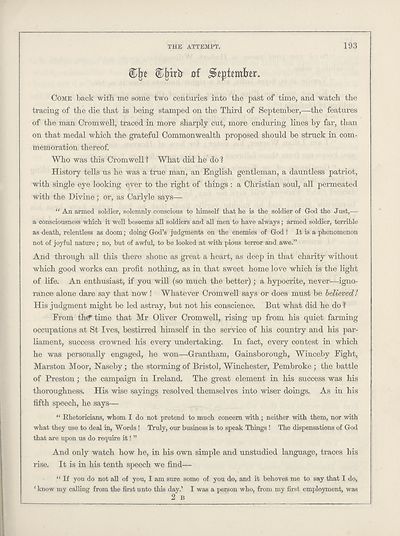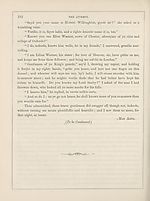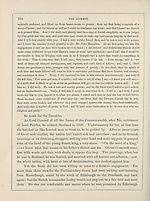Download files
Complete book:
Individual page:
Thumbnail gallery: Grid view | List view

THE ATTEMPT. 193
t C^irb oi ^t^kmhtx.
Come back with me some two centuries into the past of time, and watch the
tracing of the die that is being stamped on the Third of September,—the features
of the man Cromwell, traced in more sharply cut, more enduring lines by far, than
on that medal which the grateful Commonwealth proposed should be struck in com¬
memoration thereof.
Who was this Cromwell 1 What did he do 1
History tells us he was a true man, an English gentleman, a dauntless patriot,
with single eye looking ever to the right of things : a Christian soul, all permeated
with the Divine; or, as Carlyle says—
" An armed soldier, solemnly conscious to himself that he is the soldier of God the Just,—
a consciousness which it well beseems all soldiers and all men to have always; armed soldier, terrible
as death, relentless as doom; doing God's judgments on the enemies of God ! It is a phenomenon
not of joyful nature; no, but of awful, to be looked at with pious terror and awe."
And through all this there shone as great a heart, as deep in that charity without
which good works can profit nothing, as in that sweet home love which is the light
of life. An enthusiast, if you will (so much the better); a hypocrite, never—igno¬
rance alone dare say that now ! Whatever Cromwell says or does must be believed!
His judgment might be led astray, but not his conscience. But what did he do ?
From th^ time that Mr Oliver Cromwell, rising up from his quiet farming
occupations at St Ives, bestirred himself in the service of his country and his par¬
liament, success crowned his every undertaking. In fact, every contest in which
he was personally engaged, he won—Grantham, Gainsborough, Winceby Fight,
Marston Moor, Naseby; the storming of Bristol, Winchester, Pembroke ; the battle
of Preston ; the campaign in Ireland. The great element in his success was his
thoroughness. His wise sayings resolved themselves into wiser doings. As in his
fifth speech, he says—
" Rhetoricians, whom I do not pretend to much concern with ; neither with them, nor with
what they use to deal in, Words ! Truly, our business is to speak Things ! The dispensations of God
that are upon us do require it! "
And only watch how he, in his own simple and unstudied language, traces his
rise. It is in his tenth speech we find—
" If you do not all of you, I am sure some of you do, and it behoves me to say that I do,
' know my calling from the first unto this day.' I was a person who, from my first employment, was
2 B
t C^irb oi ^t^kmhtx.
Come back with me some two centuries into the past of time, and watch the
tracing of the die that is being stamped on the Third of September,—the features
of the man Cromwell, traced in more sharply cut, more enduring lines by far, than
on that medal which the grateful Commonwealth proposed should be struck in com¬
memoration thereof.
Who was this Cromwell 1 What did he do 1
History tells us he was a true man, an English gentleman, a dauntless patriot,
with single eye looking ever to the right of things : a Christian soul, all permeated
with the Divine; or, as Carlyle says—
" An armed soldier, solemnly conscious to himself that he is the soldier of God the Just,—
a consciousness which it well beseems all soldiers and all men to have always; armed soldier, terrible
as death, relentless as doom; doing God's judgments on the enemies of God ! It is a phenomenon
not of joyful nature; no, but of awful, to be looked at with pious terror and awe."
And through all this there shone as great a heart, as deep in that charity without
which good works can profit nothing, as in that sweet home love which is the light
of life. An enthusiast, if you will (so much the better); a hypocrite, never—igno¬
rance alone dare say that now ! Whatever Cromwell says or does must be believed!
His judgment might be led astray, but not his conscience. But what did he do ?
From th^ time that Mr Oliver Cromwell, rising up from his quiet farming
occupations at St Ives, bestirred himself in the service of his country and his par¬
liament, success crowned his every undertaking. In fact, every contest in which
he was personally engaged, he won—Grantham, Gainsborough, Winceby Fight,
Marston Moor, Naseby; the storming of Bristol, Winchester, Pembroke ; the battle
of Preston ; the campaign in Ireland. The great element in his success was his
thoroughness. His wise sayings resolved themselves into wiser doings. As in his
fifth speech, he says—
" Rhetoricians, whom I do not pretend to much concern with ; neither with them, nor with
what they use to deal in, Words ! Truly, our business is to speak Things ! The dispensations of God
that are upon us do require it! "
And only watch how he, in his own simple and unstudied language, traces his
rise. It is in his tenth speech we find—
" If you do not all of you, I am sure some of you do, and it behoves me to say that I do,
' know my calling from the first unto this day.' I was a person who, from my first employment, was
2 B
Set display mode to: Large image | Transcription
Images and transcriptions on this page, including medium image downloads, may be used under the Creative Commons Attribution 4.0 International Licence unless otherwise stated. ![]()
| Ladies' Edinburgh Debating Society publications > Attempt > Volume 3 > (207) Page 193 |
|---|
| Permanent URL | https://digital.nls.uk/104345716 |
|---|
| Attribution and copyright: |
|
|---|

